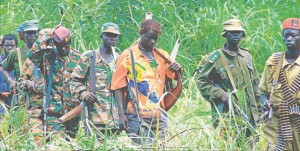LRA fighters urged to abandon their leader
By John Stephen Katende
21st Nov 2011:
The United Nations Security Council has strongly condemned ongoing attacks carried out by the rebel Lord’s Resistance Army (LRA) across Central Africa and demanded an immediate end to the atrocities. “…The Council remains deeply concerned that its previous calls for the LRA to cease its attacks have not been heeded,” the November 14th statement read in part.
In a presidential statement that followed a briefing from the top United Nations official in the region, the Council reiterated its grave concern at the atrocities committed by the LRA, which have serious humanitarian and human rights consequences, including the displacement of over 440,000 people across the region.
The LRA was formed in the late 1980s in Uganda and for over 15 years its attacks were mainly directed against Ugandan civilians and security forces, which in 2002 dislodged the rebels. They then exported their rampage to Uganda’s neighbours, such as the Democratic Republic of the Congo (DRC), the Central African Republic (CAR) and South Sudan, with practices that include the recruitment of children, rape, killing and maiming, and sexual slavery.
Over the course of the group’s existence, more than 12,000 combatants and abductees have left the LRA’s ranks and have been integrated and reunited with their families. “…The Security Council encourages the remaining LRA fighters to leave the group’s ranks and take advantage of offers of reintegration support,” the 15-member body said.
Presenting the Secretary-General’s report on the LRA-affected areas, the UN envoy for Central Africa, Abou Moussa, told the Council that the affected countries’ limited capacity to control their porous borders stretching over vast areas means that the group can move easily between the affected countries.
“…The national security forces of these countries lack the full range of resources and capabilities in areas such as logistics, intelligence-gathering and air mobility, to effectively deal with the problem on their own as well as extend their authority throughout their respective territories, protect the civilian populations and enforce the rule of law,” he stated.
Mr. Moussa added that the military operations being conducted by the affected countries should be “…intelligence-driven, targeted and ensure the containment rather than the dispersal of LRA elements” to maximize their impact. Meanwhile, the UN system is taking a number of actions to address the LRA problem in a more effective and coherent manner through its political, peacekeeping, human rights, humanitarian and development efforts in the CAR, the DRC, South Sudan and Uganda, said the envoy.
Among other actions, the UN peacekeeping operations in the region are strengthening their capacities within their mandates and capabilities in strategic locations in the LRA-affected areas to help deter attacks against civilians and facilitate humanitarian operations. Mr. Moussa is also the head of the UN Regional Office for Central Africa (UNOCA), which was established on 1 January and acts as the UN political focal point for the LRA in the region.
Briefing the Council on the work of UNOCA, he said its presence is generating a “new momentum” and creating strong expectations for a more robust approach to dealing with the challenges confronting the sub-region. These challenges include cross-border security and the activities of armed groups such as the LRA, the circulation of small arms and light weapons, drugs and human trafficking, transnational organized crime, youth unemployment and stability, illegal exploitation of natural resources, and piracy in the Gulf of Guinea.
He added that the fallout in Libya presents new challenges for countries in the sub-region, particularly Chad and the CAR. END. Please login to www.ugandacorrespondent.com every Monday to read our top stories and anytime mid-week for our news updates.
![]()


